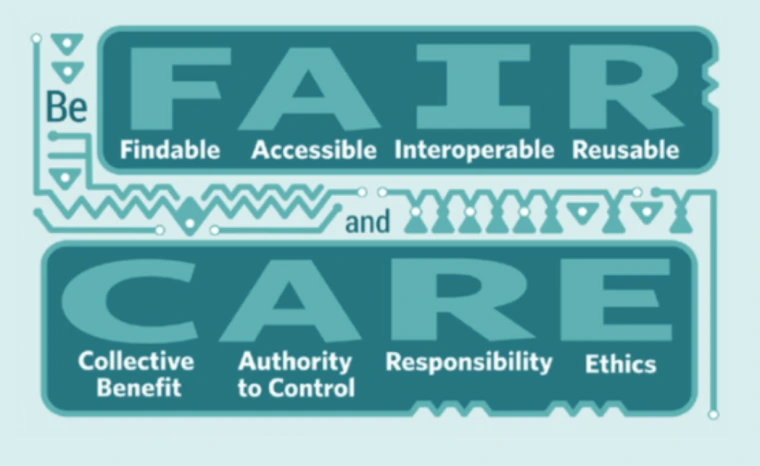New Peer-Reviewed Paper Recenters CARE Principles on Local Indigenous Contexts
Five years after the publication of the CARE Principles for Indigenous Data Governance, Native Nations Institute researchers and international colleagues remind data actors that guidelines for Indigenous data must come from Indigenous Peoples themselves.

A new peer-reviewed paper published in a special issue of the multidisciplinary scientific journal for cultural studies, Acta Borealia, aims to remind researchers and other data actors of “the original intent” of the CARE Principles for Indigenous Data Governance: “to direct data actors to local communities’ protocols and frameworks for [Indigenous data governance] IDGov, and to transform institutional policies and practices to fortify Indigenous Peoples’ authority to control their data.”
The CARE Principles (CARE) are a set of high-level guidelines that call on researchers and other data actors to ensure that all data collected concerning the knowledges, lands, cultures, and other information about Indigenous Peoples provide Collective benefit to the Peoples they concern, that those Peoples retain the Authority to control their own data, and that such data is gathered and managed Responsibly and Ethically.
CARE was created in response and as a complement to growing calls to make data universally open and available, as exemplified by the increasing profile and adoption of the FAIR Principles, defined by Mark D. Wilson and colleagues, which call on data actors to make all data Findable, Accessible, Interoperable and Reusable.
The new paper – titled “Aligning Policy and Practice to implement CARE with FAIR through Indigenous Peoples’ protocols” and authored by multiple Native Nations Institute (NNI) researchers with support from other colleagues at the Global Indigenous Data Alliance (GIDA) – appeared in a special issue of Acta Borealia edited by members of the Sápmi chapter of GIDA.
International Adoption of CARE

Originally drafted in an early form in November 2018 during a workshop at the Research Data Alliance’s International Data Week in Gaborone, Botswana, the CARE Principles were finalized over the course of the following year before they were formally adopted and published by GIDA in September 2019.
Five years after their initial publication, CARE has been adopted, endorsed, incorporated and/or implemented in some form by a range of data actors at all levels, including non-profit research organizations like the Research Data Alliance and Local Contexts; national governments including those of Australia and Aotearoa (New Zealand); and international bodies like the United Nations Educational, Scientific and Cultural Organization (UNESCO), which cited CARE in their Recommendation on Open Science, to name just a few.
But, as CARE continues to gain traction across the scientific community, some Indigenous data sovereignty (IDSov) experts have expressed concern that the popularity of the CARE Principles might lead some researchers to lean on those high-level guidelines in lieu of actually seeking input on proper protocols and standards for IDGov from local Indigenous communities themselves.
Recentering the IDGov Narrative

“Indigenous data governance is really about Indigenous Peoples’ specific protocols for the care of their data; and Indigenous Peoples, communities, tribes and nations directing what it looks like to uphold their rights over data,” says Native Nations Institute (NNI) Luce Foundation Postdoctoral Researcher Riley Taitingfong (Chamoru). “And that has to be done in a grounded and partnered way with those Peoples,” she says.
Taitingfong, who is the lead author of the new Acta Borealia paper, explains that the diversity among Indigenous Peoples and their unique traditions, customs and systems of governance mean that high-level concepts like CARE couldn’t possibly supplant the individual protocols defined by local Indigenous nation-states when it comes to control of data that are rightfully theirs.
Rather, Taitingfong says, the CARE Principles are intended only to direct data actors to data governance principles defined by Indigenous Peoples themselves. An increasing number of sovereign Indigenous communities have created their own guidelines for the collection, use and dissemination of data about their cultures, lands, citizens, and other intellectual and spiritual properties. Examples of existing, local IDGov frameworks include:
- The First Nations Principles of OCAPⓇ (Ownership, Control, Access and Possession)
- The Principles of Māori Data Sovereignty from Aotearoa New Zealand
- The Maiam nayri Wingara Principles of Australia
- US Indigenous Data Governance Principles
“Indigenous Peoples are extremely diverse,” says Taitingfong, “and the risk of using that collective terminology is that sometimes it can flatten the infinite differences in terms of the needs, knowledge systems and practices of Peoples who identify as Indigenous. And this is definitely true for the Indigenous data sovereignty movement, as well.”

Collaboratory for Indigenous Data Governance Research Coordinator Andrew Martinez (Salt River Pima-Maricopa Indian Community) is a co-author on the new paper. Martinez has been working in the IDSov and IDGov space with NNI since 2016. He says that it is precisely the popularity of CARE that led the team responsible for the new paper (many of whom were involved with the initial drafting and dissemination of the CARE Principles) to create this scholarly reminder that true IDGov happens at the community level.
“From day one, the focus of this IDSov and IDGov work has always been on the local context, with the communities themselves,” says Martinez. He explains that CARE helped build momentum around the IDSov and IDGov movements, and that it serves as a great “jumping off point” for those interested in learning more about those movements. But, he says, actual implementation of the CARE Principles requires engaging and building real relationships with Indigenous communities.
“The principles and sub-principles within CARE are written very broadly for a reason,” says Martinez, “and it's so that we can position back to local examples and point folks towards local communities.”

Stephanie Russo Carroll (Ahtna)
These sentiments are a fitting tribute to the notion put forth by senior author on the new paper and renowned IDSov and IDGov Scholar Stephanie Russo Carroll (Ahtna) that the CARE Principles alone aren’t enough to ensure proper IDGov protocols are being followed by data actors at all levels, but that those principles should instead serve as a beacon that “always points you home.”
#####

